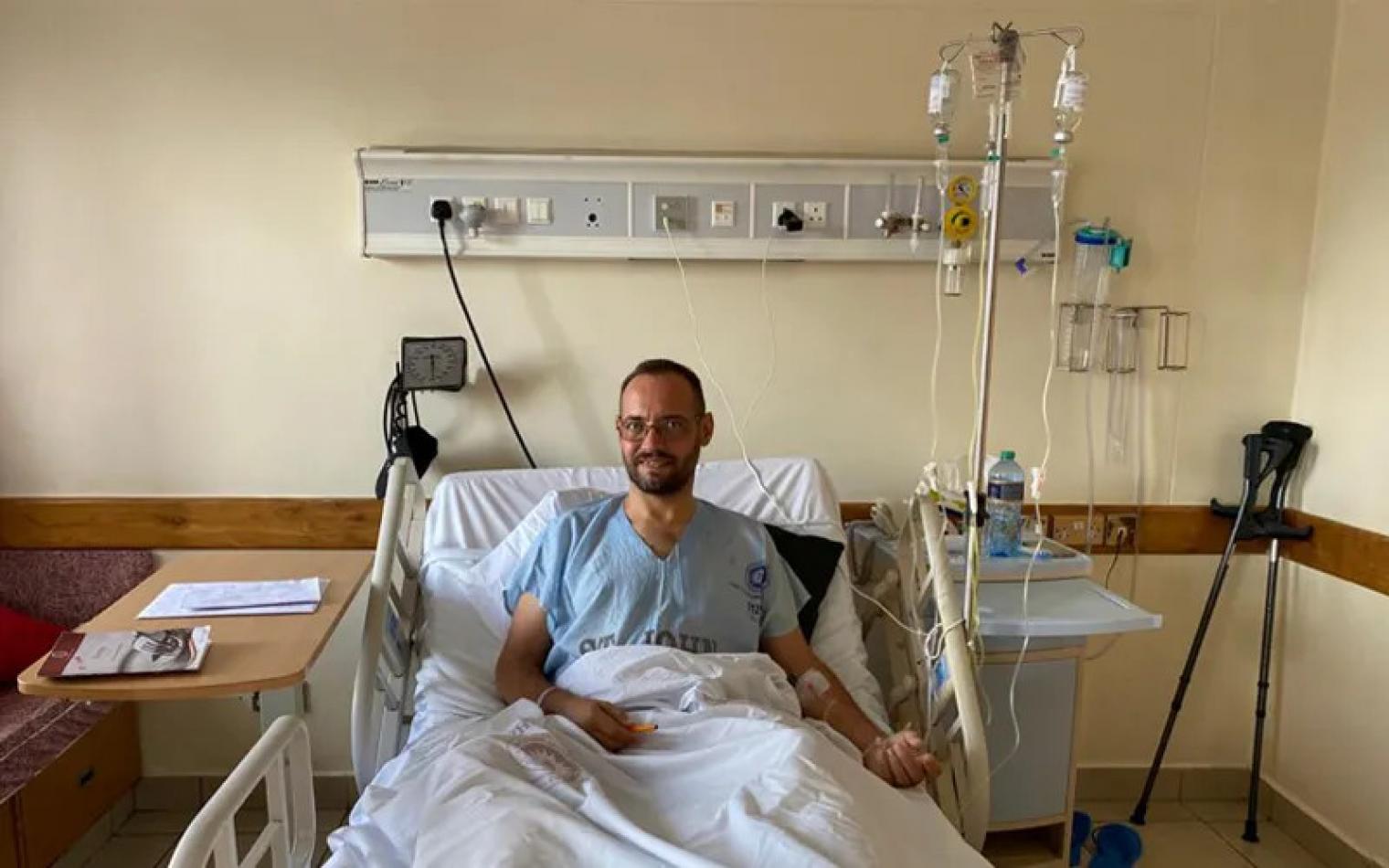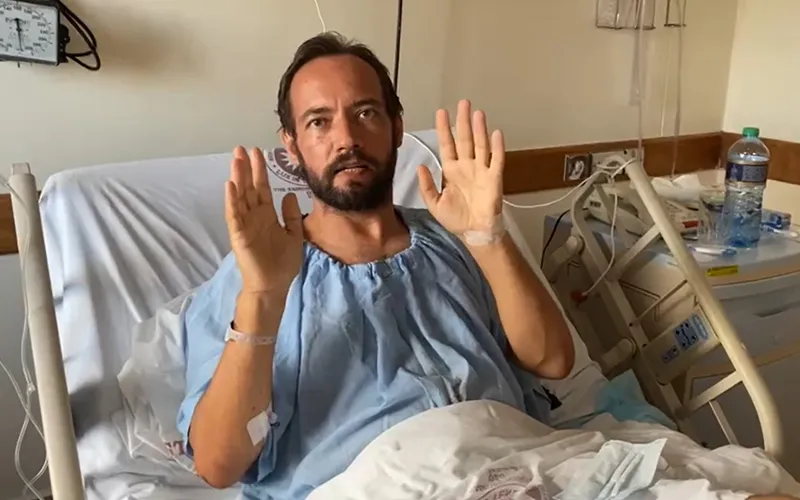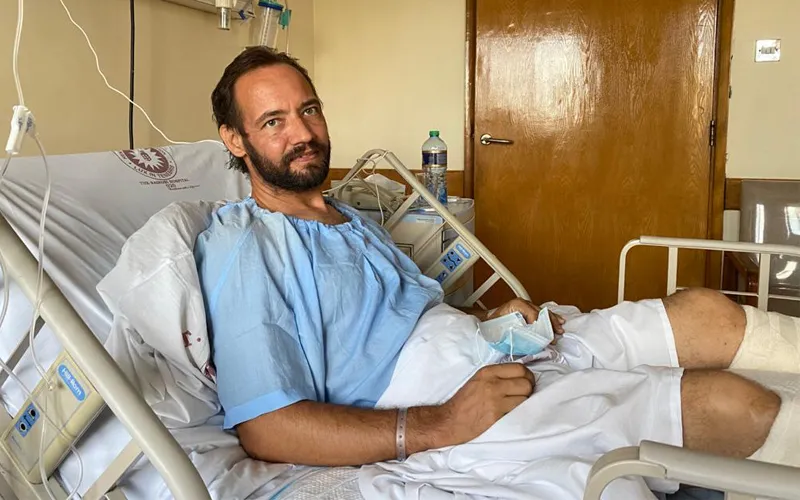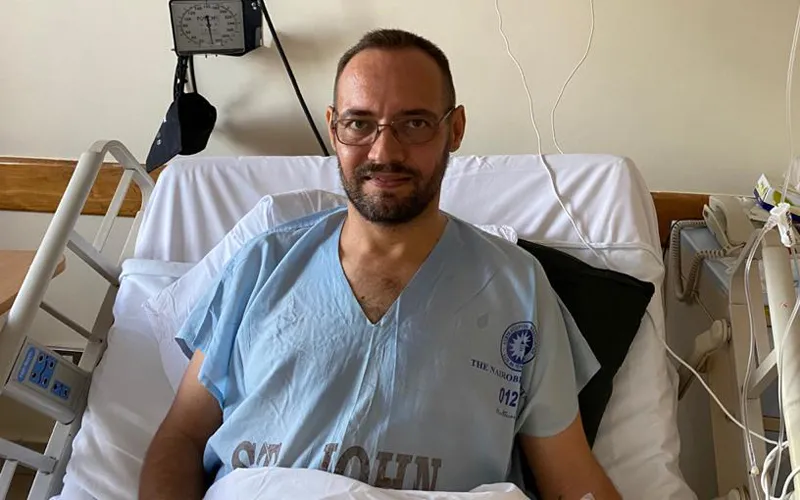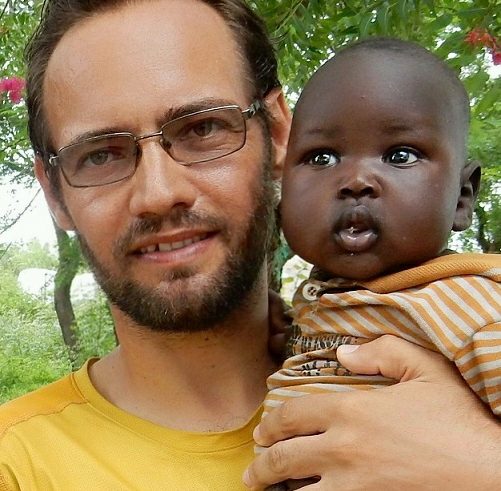Daniel Comboni
Comboni Missionaries
Institutional area
Other links
Newsletter
Wednesday, May 5, 2021
The Catholic Bishop-elect for Rumbek Diocese, Msgr. Christian Carlassare, who is nursing gunshot injuries at a hospital in Kenya says that he is offering his pain for the purification of the South Sudanese Diocese, which he is expected to shepherd. Meanwhile, today, May 5, the Holy Father Pope Francis has temporarily appointed Comboni Bishop Matthew Remijio of Wau as the Apostolic Administrator of Rumbek until the Bishop Elect, Msgr. Christian Carlassare, is healed, ordained and takes over the governance of the Rumbek Diocese, hopefully as soon as possible. [In the picture: Msgr. Christian Carlassare currently in Kenya’s capital, Nairobi for specialized treatment. Credit Photos: ACI Africa]
In a video recording by ACI Africa, Msgr. Christian Carlassare says that he is imploring God for an end to “violence, division, (and) selfish desires” among the people of God in Rumbek. From the hospital bed, Msgr. Carlassare says, “I bend low in front of God to intercede for the Church of Rumbek. I pray for the conversion of sinners.”
“I offer the pain I'm going through so that the Lord, our God, may purify the church of Rumbek from all errors and things like these may happen no more; no room for violence, division, (and) selfish desires that come from the devil.”
In the video recorded Monday, May 3, Msgr. Carlassare who was shot in both legs in the early hours of April 26 and airlifted to Kenya’s capital, Nairobi for specialized treatment offers himself as a sign for a new beginning when he will be able to walk again. “Let me be a sign for all of you. As I will rise from this bed and walk again, let Rumbek also rise again, and walk the way of peace and unity,” the Italian-born member of the Comboni Missionaries says.
He says he accepted the Holy Father’s appointment because of his love for the South Sudanese mission, and intends to fulfill “with all my heart.”
“Pope Francis and the College of Bishops send me to you, people of Rumbek, for this mission: to make the Church one, holy, Catholic, and apostolic; and I will accomplish this mission with all my heart for the love of you, and the love of South Sudan,” Msgr. Carlassare who was appointed Bishop for Rumbek Diocese March 8 after nearly a decade without a Bishop says.
He invites the people of God in Rumbek to be church guided by what Jesus Christ proclaimed, that is, “a church that is one which means united; that is holy, which means gospel like that make people to be holy; Catholic, which means that it embraces everyone no matter the clan, the tribe or the skin color; and apostolic, which means that it comes to us from Jesus through the Pope and the Bishops.”
Msgr. Carlassare was reportedly the main target of two gunmen who gained access to his room by shooting multiple bullets on his door at the Fathers’ residence at Holy Family Cathedral of Rumbek Diocese. The 43-year-old Cleric who had been serving in South Sudan’s Malakal Diocese since he arrived in the East-Central African country in 2005 traveled to Rumbek Diocese April 15 following days of spiritual retreat in Juba. His episcopal ordination that had been scheduled to take place on Pentecost Sunday, May 23 has been postponed to a later date that is yet to be determined.
In the ACI Africa video recording, Msgr. Carlassare cautions against false generalization saying, “I read titles such as “Rumbek shot the Bishop”, or internationally, “South Sudan shot the Bishop: Such a shame.”
“It is not the people of South Sudan who shot me. It is not the Dinkas who shot me, neither the Agar,” he explains and adds that those who shot him “are a group of few people” deprived of “human values and they are a shame for their community.”
He reiterated, “Rumbek does not beat and kill Priests as it happened a few years ago; Rumbek does not mistreat Religious Brothers or Sisters. Rumbek does not abuse any person. This is what we want from Rumbek. The opposite should never happen again.”
Msgr. Carlassare goes on to “invite the community leaders and local chiefs to spot out violent members of their community and apply the customary laws, which do not tolerate violence, especially when it can be avoided.”
“Do not allow violent members to hold all the community hostage. Dinka culture has no room for violence. Violence is not part of any culture in the world,” he emphasizes in his ACI Africa video message. He thanks “all Christians around the world that have been praying for me and are giving me so much courage and trust in the Lord.”
He acknowledges with appreciation the solidarity of his “elder brothers, the Bishops of Sudan and South Sudan, as they see that this attack to one member is the attack to the whole church.”
“I’m grateful for the sincere commitment of the government, from the Presidency to the authorities at the local level, to uphold the truth and take legal actions to correct the evil that has happened in Rumbek so that it may never happen again,” the Comboni Missionary says. In an interview with ACI Africa May 3, Msgr. Carlassare said that although he has been in physical pain throughout the week, the messages of solidarity and friendship have offered him the needed solace.
“It has been a painful week because my legs have been in pain almost all the time. I went through three surgeries,” he said, adding that it has also been “a week in which I experienced the closeness of many people, especially the doctors, but also many South Sudanese and friends from all over the world that sent their sympathies and solidarity.”
The secret of his day-to-day living on a hospital bed for seven continuous days and counting, he said, “has been the Lord that has been present through the time I have been on this bed, to pray and to feel his presence; I realized that my life is in his hands, and whatever I will do in the future, will be for his good and this mission.”
“I accept also to live at this time in this bed, to wait, to be patient, to accept that healing takes time, both the healing of the body, and also the healing of the heart,” Msgr. Carlassare told ACI Africa, adding that it is for his healing and also that “Rumbek may take care of the wounds that are there to start the process of healing” that his episcopal ordination has been postponed.
In the May 3 interview, Msgr. Carlassare cautions the people of God in Rumbek against interpreting the postponement as “abandonment” and instead take it as “a time of preparation,” lived with hope, “looking at the Lord to understand the journey that He's asking us to walk through.”
“Certainly, we will be reunited and we will be reunited with purpose, without the confusion or doubt or fear that had been there the last weeks,” he said, reiterating his May 27 message in an ACI Africa video recording.
Speaking about the process of physical healing, Msgr. Carlassare said, “The doctors are very hopeful because they trust that the muscles that have been damaged may form again. Of course, they will need a long time of training so that they may reshape like they were before.”
“I am trustful that I may be able to walk like before. Maybe I will not be able to play football as I liked, but I will still walk,” the Bishop-elect for Rumbek Diocese told ACI Africa May 3.
He underscored the need for unity founded on reconciliation saying, “Let us be united in prayer, overcoming old grudges and violence that starts in our heart. Let us be understanding. Let us be good to one another. Let us really hold hand in hand overcoming the wounds and the difficulties that a conflict brought to South Sudan and created a culture of violence that has now to disappear.”
By ACI Africa Editorial Team
Bishop Carlassare (Rumbek):
“I dream of a South Sudan without conflict and violence”
A week after having been shot in both legs, the bishop of Rumbek, Monsignor Christian Carlassare, spoke to SIR from the Nairobi hospital. He underwent two more surgeries and physical therapy will take time, therefore the Ordination ceremony in the diocese scheduled for May 23rd will not take place. His are words of justice, reparation, forgiveness and hope.
The Ordination ceremony in the diocese, planned for May 23rd, has been deferred until after Monsignor Christian Carlassare, Bishop of Rumbek in South Sudan shot in the legs in an ambush, recovers “in body and spirit, from the trauma and until the necessary steps have been taken to permit my return to Rumbek”: “Namely, the continuance of criminal investigation and identification of the offenders, the ensuing judgment and guarantees that I will be safe when I go there and that no other such attack will take place”, Monsignor Carlassare told SIR on Tuesday, one week after the attack by two gunmen who stormed the curia in Rumbek in the middle of the night.
After having been shot and wounded in both legs the bishop found a mobile phone belonging to the assailants, which allowed investigators to retrace their previous communications. Among the 24 people arrested were also some priests and collaborators of the diocese. “I have not been briefed on the investigation,” said the Comboni bishop, “but I learned that more people allegedly involved or supporting the attack have been arrested. I reckon that those who carried out the crimes and those who sent them are few. I hope this will not cause confusion in the investigations. I leave it to the government to conduct its own investigations and only then, based on the conclusions, I will also be able to draw conclusions.”
Monsignor Carlassare, 43, born in Schio, originally from Piovene Rocchette (diocese of Padua, Italy), is the youngest bishop in the world. He was appointed bishop by Pope Francis on March 8 and had arrived some ten days earlier in Rumbek, a diocese marked by tense relations between the Dinka (majority) and Nuer ethnic groups, whose bishopric fell vacant after the death of Comboni bishop Cesare Mazzolari ten years ago. Monsignor Carlassare is now being treated in hospital in Nairobi, where he underwent two more surgeries on his legs and might also be needing a skin transplant: “I am still in bed, I cannot move or put weight on my legs, everything will depend on the physical therapy. It will take at least a month or a month and a half for my muscle cells to regenerate, allowing me to return to walking normally.”
Will you return to Rumbek? With which spirit?
I certainly want to return to Rumbek, my commitment remains unaltered. When I learned I had been appointed bishop of Rumbek I was aware that it was a problematic diocese because the see had been vacant for ten years. When I accepted, I knew I was headed for a difficult situation with a need for clarity. I was aware that there had been various problems in the past, including violent incidents against priests and nuns. Once I arrived in Rumbek my concern was to cooperate with everyone, to identify the good intentions and the shortcomings. Obviously no one is completely evil, so I sought to work with everyone, including those with a record of disturbing allegations or reports. In the first ten days I was welcomed by everyone, I noticed good intentions on everyone’s part. I knew I could completely trust some of the people I worked with. Others I had yet to understand. Certainly I would never have expected this kind of response after ten days, utterly uncalled for and out of proportion.
You issued numerous appeals for forgiveness and reconciliation: do you think they will facilitate a process that is still fraught with obstacles?
Many people have approached me with great respect, praising the intention behind my call for forgiveness. However, some have said that justice is needed more than forgiveness. I agree, because when a crime is committed, that harm must first be repaired and a fair decision must help the offender(s) to convert, change and acknowledge their wrongdoing. It is not a matter of blanket forgiveness, as if nothing had ever happened.
There must be a willingness to bear responsibility for the crimes committed. However, in the face of all the evil in the world, only forgiveness offers hope for the future. This is something I firmly believe in: while demanding justice and lawful procedures, there is also a personal need for forgiveness. This doesn’t mean reversing things to how they were before. Hearts must be healed by forgiveness. Forgiveness is first and foremost an inner desire. But I also think that that same need can be felt by the offender(s), when they acknowledge their guilt and want to change because they feel loved. This is a new experience in South Sudan. I believe that those who committed this deed have a strong need to feel loved, despite what they have done.
Have you been informed of any new developments in the investigation?
I don’t know much about the ongoing investigation because it is obviously confidential. All I know is that it began with the mobile phone dropped by the two attackers, which I saw and gave to the priest who came to help me. That led to the first arrests of people who had been in touch with them during the days leading up to the attack. A total of 24 people had been identified earlier, but I learned that more people allegedly involved or supporting the attack have also been arrested. I reckon that those who carried out the crimes and those who sent them are few. I hope this will not cause confusion in the investigations. I leave it to the government to conduct its own investigations and only then, based on the conclusions, I will draw the necessary conclusions myself. The Pope has publicly voiced his support, how did it make you feel? Also the Church of South Sudan released a statement.
I was moved by the Pope’s support. He has so much weighing on his shoulders and I would never have wanted to burden him with this. I spoke with the bishops of South Sudan and the nuncio in Kenya, who also serves South Sudan, who conveyed the greetings of Archbishop Paul Richard Gallagher, Secretary for Relations with States, scheduled to ordain me. We must obviously all be co-responsible and carry the weight of the Church together. I recognise the Pope as a great apostle, teacher and father and I follow him in his footsteps. I feel the support of the Church, because I am Church and I want to be the support that people need to see. All I need is to incarnate that reality that others want to see in the Church: a Church that is true Church, a disciple, a Church that pays the price. A Church close to the poor, that suffers and redeems. I received the sympathy of so many people, men and women of faith, who prayed for me and gave me great courage. Being Christian is not about words, being Christian means having converted to a good and different life.
Now that the initial shock has somewhat subsided, what is your appeal to the people of Rumbek, to the Sudanese people?
My appeal to the people of Rumbek and to all Sudanese people is to dream big and put aside all the anger, discontent and dissatisfaction caused by the conflicts and by an endless wave of violence that prevents us from dreaming of a different world, this is the world where the strongest is always the winner, where in order to obtain what you deserve you have to fight. This is not South Sudan, it is not the Nuer, it is not Dinka, no tribe does this. It is necessary to rediscover the noble African values of the family, the values of solidarity, communion and peace, which existed before the violent events of the last 50 years of conflict. I dream of a Dinka culture and a Nuer culture freed from all those elements of violence, fostering a life of togetherness and beauty, where everyone is equal and can enjoy resources in equality.
How could the international community help South Sudan?
My invitation to the international community is to view Africa through new and different lenses. I would like them to recognise Africa’s noble values and to listen to the African people’s requests to have access to resources, to be given the possibility to develop to their full potential. Italy often has a negative attitude that does not do it justice, whereas Africa is beautiful, flourishing, growing and has already surpassed us in terms of civilisation. There are many beautiful things that can be brought to light, rather than the negative aspects that we are used to emphasising. If Africa succeeds in overcoming its own problems of ungovernability and violence, it will have the potential to save the world in many respects: it has the potential to renew the world, to propose renewed spirituality, new forms of economic life, solidarity and communion.
[Patrizia Caiffa – SIR]

